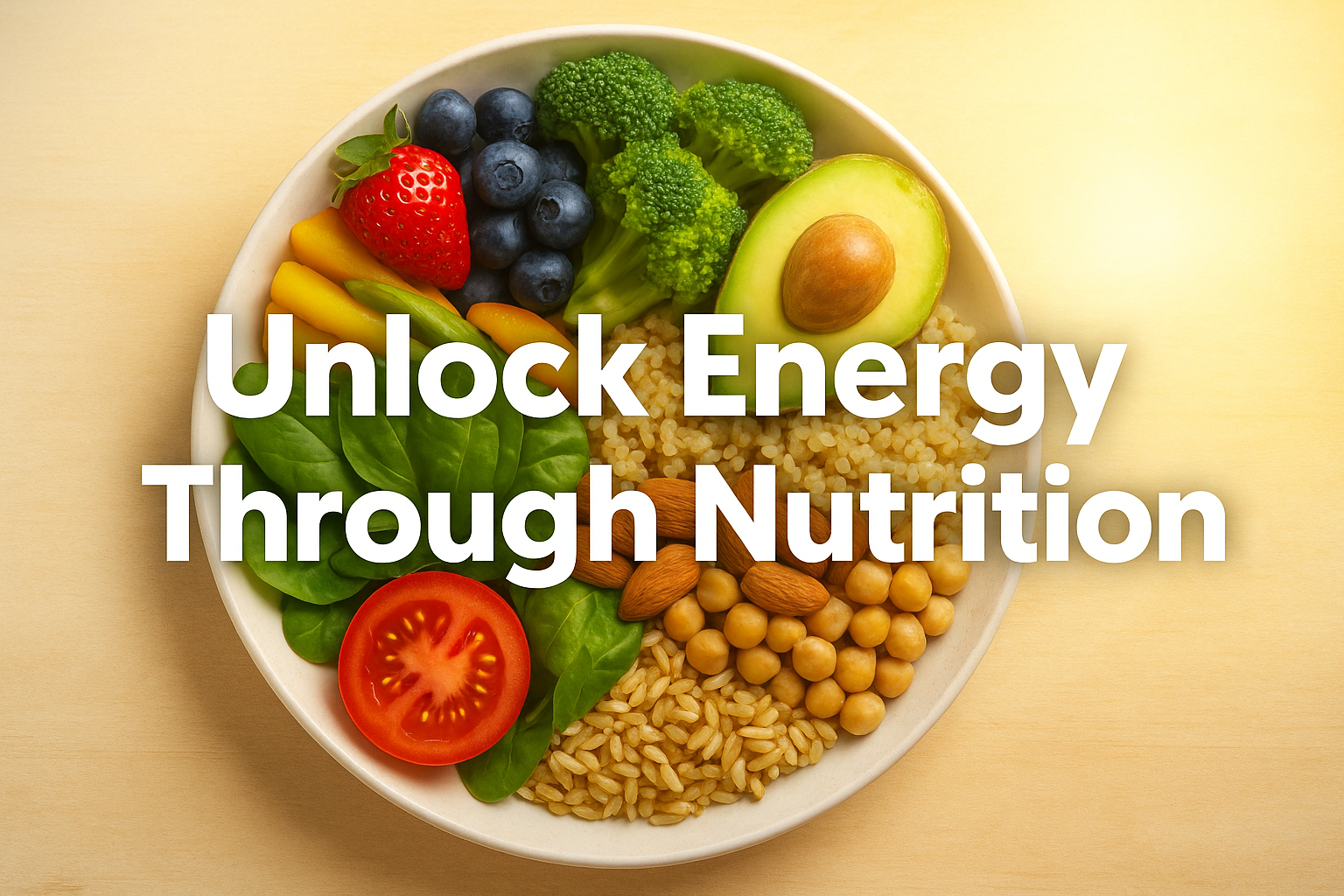🍎The Power of Food: Unlocking Energy Through Nutrition🍎
Introduction
In today’s fast-paced world, we often underestimate one of the most powerful tools for boosting our vitality — food. Beyond satisfying hunger, the right nutrition has the potential to transform your energy, focus, and overall wellness. If you’ve ever felt drained halfway through your day or struggled with constant fatigue, it’s time to take a closer look at what’s fueling your body.
Food isn’t just about calories — it’s information for your cells. The nutrients you consume influence how efficiently your body converts food into energy. Let’s explore how the power of food can help you unlock lasting energy through nutrition and fuel a more vibrant, productive life.
1. Understanding the Science of Energy: How Food Powers the Body
Every movement, heartbeat, and breath you take depends on energy derived from the food you eat. The body breaks down nutrients to produce adenosine triphosphate (ATP) — the molecule that powers cellular activity.
Macronutrients: The Big Three
- Carbohydrates:
Your body’s preferred energy source. Complex carbs like oats, quinoa, and sweet potatoes break down slowly, providing steady energy without crashes.
- Carbohydrates:
- Proteins:
Often thought of as muscle-builders, proteins also play a key role in stabilizing energy by supporting tissue repair and enzyme production.
- Proteins:
- Fats:
Healthy fats from sources like avocados, nuts, and olive oil provide long-term, slow-burning energy and support brain function.
- Fats:
Micronutrients Matter Too
Vitamins and minerals — such as B vitamins, iron, and magnesium — are essential cofactors in energy metabolism. Without them, your body can’t efficiently transform food into usable energy.
When you understand this science, it becomes clear: energy is built from what you eat, not just from caffeine or supplements.
2. Food Quality and Energy Levels: Why Real Food Matters
Not all calories are created equal. You could consume 300 calories from a sugary soda or from a balanced meal of oats, fruit, and nuts — and your body would respond very differently.
Whole Foods vs. Processed Foods
- Whole foods provide vitamins, minerals, fiber, and phytonutrients that promote stable blood sugar and sustained energy.
- Processed foods, on the other hand, are stripped of nutrients and often loaded with refined sugar and unhealthy fats that cause energy crashes.
The Energy Rollercoaster
Refined carbs and sugary snacks trigger a rapid rise in blood sugar followed by a sharp drop — leaving you tired, irritable, and craving more sugar. Whole foods help you stay off this rollercoaster, maintaining consistent focus and vitality.
If you want to unlock your true energy potential, start by cleaning up your plate — more color, fewer ingredients you can’t pronounce.
3. Timing Is Everything: When and How You Eat Matters
Even the healthiest diet can fall short if your meal timing is off. The rhythm of your eating habits affects blood sugar, digestion, and metabolism — all of which influence energy levels.
Don’t Skip Breakfast
A nutritious breakfast jumpstarts your metabolism after an overnight fast. Choose balanced options like:
- Oatmeal with fruit and nuts
- Eggs with whole-grain toast
- Greek yogurt with berries and seeds
Eat Every 3–4 Hours
Spacing meals evenly helps prevent fatigue and overeating. Combine protein, fiber, and healthy fats in each meal for sustained fuel.
Stay Hydrated
Dehydration is one of the most overlooked causes of low energy. Drink water throughout the day and include hydrating foods like cucumbers, oranges, and watermelon.
Smart Snacking
Keep snacks balanced — think almonds with an apple, hummus with veggies, or boiled eggs with avocado. This keeps your blood sugar stable and your energy high between meals.
4. Power Foods That Naturally Boost Energy
Complex Carbohydrates
When it comes to unlocking energy through nutrition, certain foods have exceptional benefits. Let’s look at the top contenders that can transform how you feel every day.
- Quinoa, brown rice, oats, and sweet potatoes release energy slowly and keep you full longer.
Lean Proteins
- Eggs, chicken, fish, tofu, and lentils help repair tissues and stabilize energy without spikes or crashes.
Healthy Fats
- Avocados, nuts, seeds, and olive oil promote brain clarity and provide sustained fuel.
Iron-Rich Foods
- Spinach, red meat, beans, and fortified cereals improve oxygen transport, reducing fatigue.
Vitamin B Complex
- Found in whole grains, eggs, dairy, and leafy greens, B vitamins are essential for energy metabolism.
Antioxidant-Rich Foods
- Berries, green tea, and dark chocolate protect your cells from oxidative stress, keeping you energized and youthful.
Sample Energy-Boosting Meal Plan
- Breakfast: Oatmeal topped with banana and chia seeds
- Lunch: Grilled chicken with quinoa and vegetables
- Snack: Greek yogurt with mixed berries
- Dinner: Baked salmon, sweet potato, and spinach salad
5. Nutrition and Lifestyle: The Perfect Energy Partnership
True energy doesn’t come from food alone — it’s a product of nutrition, sleep, movement, and stress management.
Sleep Well
No diet can replace the benefits of quality sleep. Aim for 7–9 hours per night to restore energy and balance hormones.
Exercise Regularly
Physical activity boosts circulation, oxygen delivery, and metabolism. Even a 20-minute walk can revitalize your body.
Manage Stress
Chronic stress depletes nutrients like magnesium and vitamin B, both vital for energy. Practice mindfulness, breathing, or yoga to restore balance.
Mindful Eating
Slow down and pay attention to your food. Mindful eating improves digestion and prevents overeating, which can cause sluggishness.
Gut Health and Energy
A healthy gut microbiome enhances nutrient absorption and serotonin production — both key to lasting vitality.
6. Common Nutrition Mistakes That Drain Your Energy
Many people unknowingly sabotage their energy with poor nutrition habits. Here are some common pitfalls — and how to fix them.
1. Relying Too Much on Sugar and Caffeine
While they provide a quick burst of energy, the crash that follows leaves you more tired than before. Swap coffee refills for herbal teas or matcha.
2. Skipping Meals
Missing meals slows metabolism and reduces concentration. Prioritize balanced eating — even small meals are better than nothing.
3. Ignoring Protein and Iron
Low intake of these nutrients leads to muscle fatigue and weakness. Include iron-rich and protein-packed foods in every meal.
4. Not Drinking Enough Water
Fatigue is often a sign of dehydration. Aim for 2–3 liters of water daily, and more if you’re active.
5. Overeating Processed Foods
These lack essential nutrients and overload your system with unhealthy fats and sodium. Focus on whole, colorful foods.
Correcting these small mistakes can dramatically improve how energetic you feel throughout the day.
7. Creating a Personalized Energy-Boosting Nutrition Plan
One-size-fits-all diets don’t work. Your energy needs depend on your age, gender, activity level, and lifestyle. Building a personalized nutrition plan ensures your body gets exactly what it needs.
Assess Your Energy Requirements
Use your daily routine to determine when you need the most fuel — for example, morning workouts or long work sessions.
Build a Balanced Plate
Use the “½ veggies, ¼ protein, ¼ whole grains” rule for every meal. Add a source of healthy fat and hydration for a complete balance.
Meal Prep for Consistency
Planning ahead helps you make better food choices. Prepping energy snacks or healthy lunches prevents reliance on fast food.
Sample One-Day Plan
- Breakfast: Scrambled eggs, spinach, and whole-grain toast
- Snack: Handful of mixed nuts
- Lunch: Lentil salad with olive oil and lemon dressing
- Snack: Apple with peanut butter
- Dinner: Grilled fish, brown rice, and steamed vegetables
Consistency Over Perfection
Energy transformation takes time. Stick to small, consistent changes and listen to your body — it knows what it needs.
8. Conclusion: Harness the Power of Food
The secret to endless energy doesn’t lie in another cup of coffee — it’s already on your plate. By eating whole, nutrient-dense foods and aligning your meals with your lifestyle, you can unlock energy through nutrition and elevate every aspect of your life.
Remember:
- Food is not just fuel — it’s your body’s most powerful source of vitality.
- Choose balance, hydration, and mindfulness.
- Your daily habits define how energized you feel tomorrow.
Harness the power of food and start nourishing your body for sustained energy, focus, and wellness.
Frequently Asked Questions (FAQs)
1. What are the best foods for long-lasting energy?
Whole grains, lean proteins, healthy fats, and fiber-rich fruits and vegetables are best for steady energy throughout the day.
2. Why do I feel tired even after eating?
You may be eating too many refined carbs or large portions, causing blood sugar spikes and crashes. Try balanced meals with protein and fiber.
3. How often should I eat to maintain energy levels?
Eat balanced meals every 3–4 hours. This keeps your metabolism active and prevents energy dips.
4. Is caffeine a good way to boost energy?
Caffeine offers temporary alertness, but overreliance can cause crashes and disrupt sleep. Use it moderately.
5. Can vitamins really help with fatigue?
Yes. B vitamins, magnesium, and iron are essential for energy metabolism. Deficiency in these can lead to tiredness.
6. Does hydration affect energy?
Absolutely. Even mild dehydration can cause fatigue and lack of focus. Drink water regularly throughout the day.
7. How can I boost my energy naturally without supplements?
Eat nutrient-dense foods, stay hydrated, sleep well, manage stress, and exercise regularly — all of which naturally increase energy.
More Post Like:https://inspirejournal24.com/daily-nutrition-habits-to-boost-energy/

Lalu Mestri is a passionate content writer specializing in SEO-focused articles, news analysis, and informative blog content. He has experience creating well-researched, engaging, and reader-friendly content across a variety of topics, including current events, lifestyle, and digital trends. Lalu focuses on delivering clear, accurate, and valuable information while maintaining strong search engine optimization practices. His goal is to help readers understand complex subjects through simple, structured, and high-quality writing.
